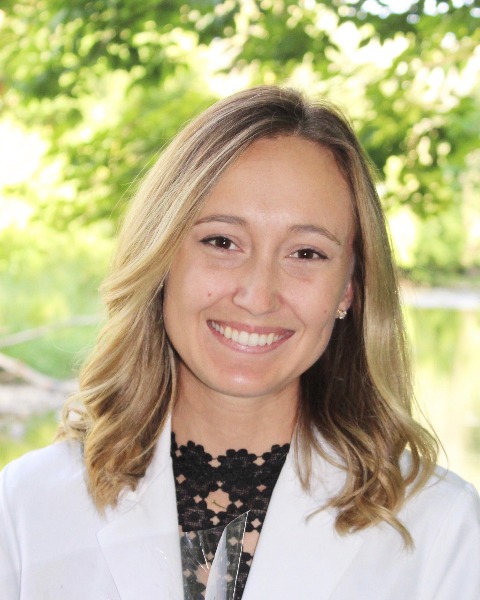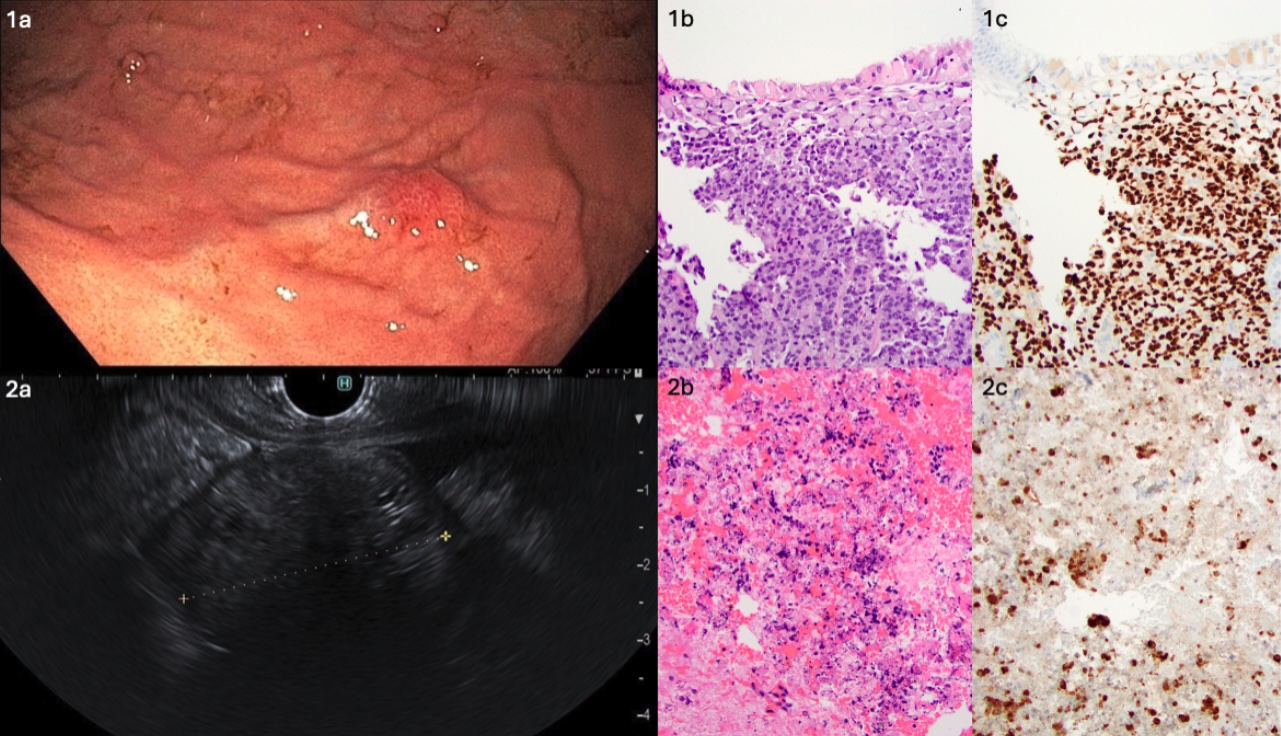Monday Poster Session
Category: Stomach and Spleen
P4206 - Polyp Fiction: A Gastric Lesion Reveals a Breast Cancer Story
Monday, October 27, 2025
10:30 AM - 4:00 PM PDT
Location: Exhibit Hall

Marie Balfour, MD (she/her/hers)
University of California Irvine Health
Orange, CA
Presenting Author(s)
Marie Balfour, MD1, Nicholas Garcia, MD1, Momin Masroor, MD2, Trevor McCracken, MD2, Frances Dang, MD, MSc3, Peter H. Nguyen, MD1, Joshua Kwon, MD1, Sejal Shah, MD1, John G. Lee, MD4
1University of California Irvine Health, Orange, CA; 2University of California Irvine, Orange, CA; 3University of California Irvine, Irvine, CA; 4UC Irvine Digestive Health Institute, Orange, CA
Introduction: The most common sites of breast cancer metastases include the lungs, liver, brain, and bones. Breast cancer metastases to the stomach are very rare due to blood flow and lymphatic drainage patterns as well as gastrointestinal microenvironmental factors.
Case Description/
Methods: A 64-year-old woman with history of stage IV ER+ PR+ HER2- invasive lobular carcinoma in remission for nearly 6 years status post right mastectomy and radiation presented to our hospital after a pathologic right femur fracture was discovered. Prior to admission, she had reported severe esophageal reflux symptoms, vomiting, and worsening urinary incontinence to her primary care physician, but did not endorse any changes in bowel habits. She was found to have a new pelvic mass encasing the aorta, inferior vena cava, ureters, lower uterus, and rectum. A CT scan of her femur showed a pathologic fracture with an associated adjacent ill-defined peripheral enhancing mass predominantly centered within the anterior thigh musculature. EGD evaluation revealed an 8–10-millimeter gastric polypoid lesion that was biopsied. EUS fine needle aspiration (FNA) of the pelvic mass encasing the rectum was performed. Final pathology results from the femur mass biopsy, gastric polyp biopsy, and rectal mass FNA cytology showed poorly differentiated carcinoma consistent with metastasis from the patient’s primary breast cancer.
Discussion: To our knowledge, this is one of the few known cases of incidentally found breast cancer metastases in the gastrointestinal tract after clinical remission that presented with simultaneous gastric and pericolonic involvement. Due to the extremely low rates of breast cancer metastases to the gastrointestinal tract, these types of metastases are often not investigated in routine screening even after the discovery of metastatic breast cancer unless patients demonstrate symptoms concerning for gastrointestinal malignancy. Patients with invasive lobular carcinomas, like our patient, have a stronger incidence of gastrointestinal metastases than ductal carcinomas. As these metastatic lesions can mimic primary gastric malignancy, it is important to obtain definitive pathology results before considering treatment options.

Figure: Figure 1a: 8-10 mm gastric polypoid lesion seen on EGD.
Figure 1b: Gastric polypoid lesion biopsy shows poorly differentiated carcinoma with focal signet ring cell features involving the lamina propria of the gastric mucosa (H&E, 10x).
Figure 1c: The tumor cells are positive for keratin (not pictured) and estrogen receptor immunohistochemical stain (pictured 10x), consistent with metastasis from breast primary.
Figure 2a: Rectal EUS showing 35.8 mm mass surrounding part of the rectum. Mass biopsy was consistent with metastatic breast carcinoma.
Figure 2b: Peri-rectal mass fine needle aspiration (FNA) shows blood with scattered markedly atypical epithelial cells arranged in small clusters and as single cells (H&E, 10x).
Figure 2c: These FNA tumor cells are positive for estrogen receptor (not pictured) and mammaglobin immunohistochemical stain (pictured 10x), consistent with metastasis from breast primary.
Disclosures:
Marie Balfour indicated no relevant financial relationships.
Nicholas Garcia indicated no relevant financial relationships.
Momin Masroor indicated no relevant financial relationships.
Trevor McCracken indicated no relevant financial relationships.
Frances Dang: Cook Medical – Speaker.
Peter Nguyen indicated no relevant financial relationships.
Joshua Kwon indicated no relevant financial relationships.
Sejal Shah indicated no relevant financial relationships.
John Lee indicated no relevant financial relationships.
Marie Balfour, MD1, Nicholas Garcia, MD1, Momin Masroor, MD2, Trevor McCracken, MD2, Frances Dang, MD, MSc3, Peter H. Nguyen, MD1, Joshua Kwon, MD1, Sejal Shah, MD1, John G. Lee, MD4. P4206 - Polyp Fiction: A Gastric Lesion Reveals a Breast Cancer Story, ACG 2025 Annual Scientific Meeting Abstracts. Phoenix, AZ: American College of Gastroenterology.
1University of California Irvine Health, Orange, CA; 2University of California Irvine, Orange, CA; 3University of California Irvine, Irvine, CA; 4UC Irvine Digestive Health Institute, Orange, CA
Introduction: The most common sites of breast cancer metastases include the lungs, liver, brain, and bones. Breast cancer metastases to the stomach are very rare due to blood flow and lymphatic drainage patterns as well as gastrointestinal microenvironmental factors.
Case Description/
Methods: A 64-year-old woman with history of stage IV ER+ PR+ HER2- invasive lobular carcinoma in remission for nearly 6 years status post right mastectomy and radiation presented to our hospital after a pathologic right femur fracture was discovered. Prior to admission, she had reported severe esophageal reflux symptoms, vomiting, and worsening urinary incontinence to her primary care physician, but did not endorse any changes in bowel habits. She was found to have a new pelvic mass encasing the aorta, inferior vena cava, ureters, lower uterus, and rectum. A CT scan of her femur showed a pathologic fracture with an associated adjacent ill-defined peripheral enhancing mass predominantly centered within the anterior thigh musculature. EGD evaluation revealed an 8–10-millimeter gastric polypoid lesion that was biopsied. EUS fine needle aspiration (FNA) of the pelvic mass encasing the rectum was performed. Final pathology results from the femur mass biopsy, gastric polyp biopsy, and rectal mass FNA cytology showed poorly differentiated carcinoma consistent with metastasis from the patient’s primary breast cancer.
Discussion: To our knowledge, this is one of the few known cases of incidentally found breast cancer metastases in the gastrointestinal tract after clinical remission that presented with simultaneous gastric and pericolonic involvement. Due to the extremely low rates of breast cancer metastases to the gastrointestinal tract, these types of metastases are often not investigated in routine screening even after the discovery of metastatic breast cancer unless patients demonstrate symptoms concerning for gastrointestinal malignancy. Patients with invasive lobular carcinomas, like our patient, have a stronger incidence of gastrointestinal metastases than ductal carcinomas. As these metastatic lesions can mimic primary gastric malignancy, it is important to obtain definitive pathology results before considering treatment options.

Figure: Figure 1a: 8-10 mm gastric polypoid lesion seen on EGD.
Figure 1b: Gastric polypoid lesion biopsy shows poorly differentiated carcinoma with focal signet ring cell features involving the lamina propria of the gastric mucosa (H&E, 10x).
Figure 1c: The tumor cells are positive for keratin (not pictured) and estrogen receptor immunohistochemical stain (pictured 10x), consistent with metastasis from breast primary.
Figure 2a: Rectal EUS showing 35.8 mm mass surrounding part of the rectum. Mass biopsy was consistent with metastatic breast carcinoma.
Figure 2b: Peri-rectal mass fine needle aspiration (FNA) shows blood with scattered markedly atypical epithelial cells arranged in small clusters and as single cells (H&E, 10x).
Figure 2c: These FNA tumor cells are positive for estrogen receptor (not pictured) and mammaglobin immunohistochemical stain (pictured 10x), consistent with metastasis from breast primary.
Disclosures:
Marie Balfour indicated no relevant financial relationships.
Nicholas Garcia indicated no relevant financial relationships.
Momin Masroor indicated no relevant financial relationships.
Trevor McCracken indicated no relevant financial relationships.
Frances Dang: Cook Medical – Speaker.
Peter Nguyen indicated no relevant financial relationships.
Joshua Kwon indicated no relevant financial relationships.
Sejal Shah indicated no relevant financial relationships.
John Lee indicated no relevant financial relationships.
Marie Balfour, MD1, Nicholas Garcia, MD1, Momin Masroor, MD2, Trevor McCracken, MD2, Frances Dang, MD, MSc3, Peter H. Nguyen, MD1, Joshua Kwon, MD1, Sejal Shah, MD1, John G. Lee, MD4. P4206 - Polyp Fiction: A Gastric Lesion Reveals a Breast Cancer Story, ACG 2025 Annual Scientific Meeting Abstracts. Phoenix, AZ: American College of Gastroenterology.

